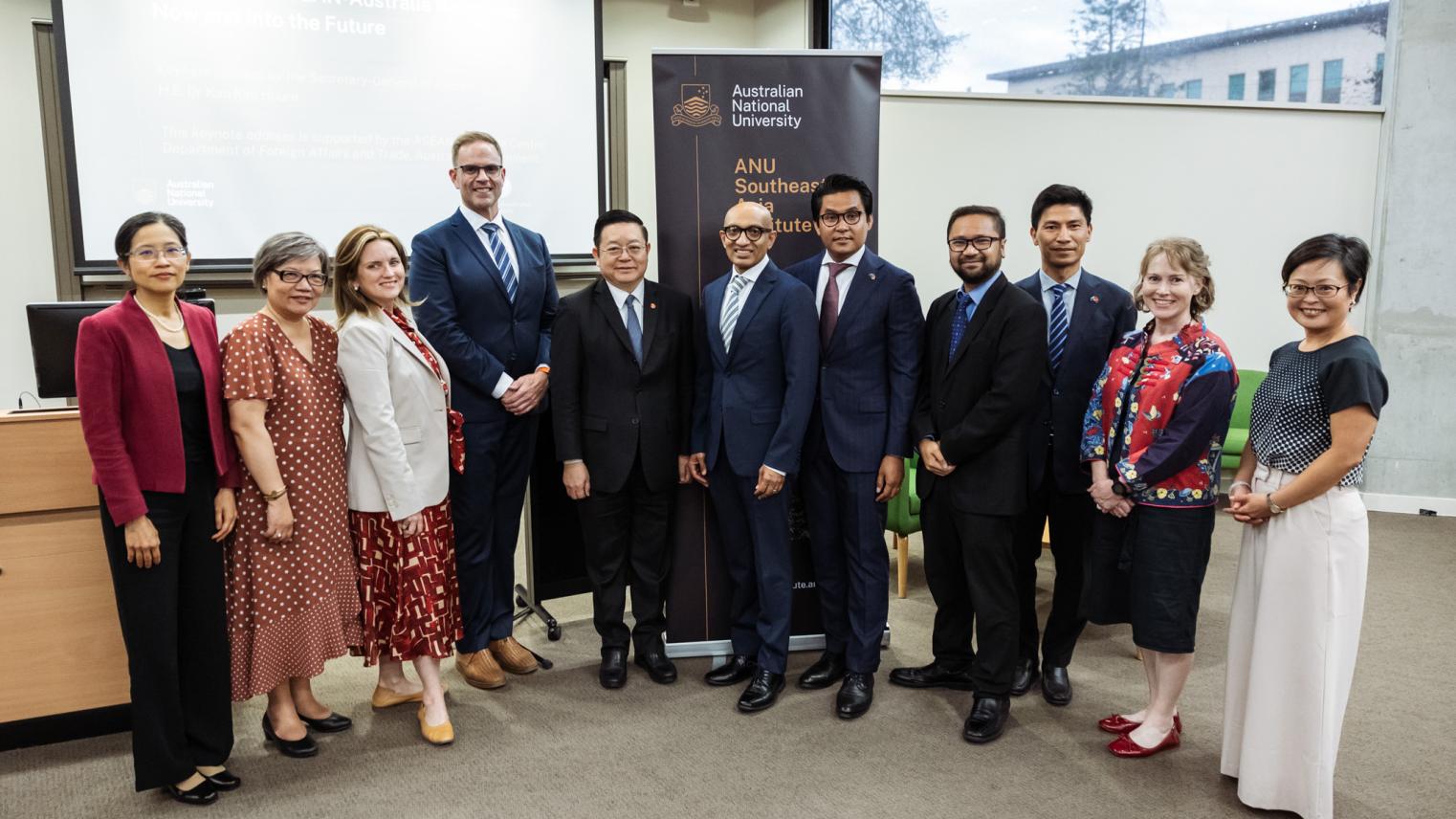Shaping Tomorrow’s Experts: The 2024 Southeast Asia Research Symposium

The 2024 ANU Southeast Asia Institute Student Research Symposium offered an inspiring platform for students to deepen their understanding of Southeast Asia’s most pressing issues, network with leading experts, and showcase their research. Held at the ANU College of Asia and the Pacific (CAP), this year's event brought together students, academics, and practitioners to explore the region’s dynamic political, economic, and social landscapes.
Organised by the ANU Southeast Asia Institute and supported by the ASEAN-Australia Centre, the symposium showcased cutting-edge research such as tracking democracy in Southeast Asia and considering the impacts of the Myanmar conflict on teachers.
The highlight of the symposium was the keynote address delivered by Dr Kao Kim Hourn, Secretary-General of ASEAN, whose insights on ASEAN's evolving role in the region captivated the audience. Dr Kao underscored how ASEAN has maintained peace and stability in the region, enabling significant economic prosperity. He emphasised the importance of proactive and resilient leadership, particularly as ASEAN prepares to adopt the ASEAN Community Vision 2045 and its four Strategic Plans next year. He also highlighted the essential role of external partners, including Australia, in supporting ASEAN's community-building efforts, reinforcing the importance of collaboration in shaping the region’s future.
“It’s crucial that events like this continue to build the next generation of leaders and policymakers,” Dr Kao remarked.
For many students, the symposium was a unique opportunity to engage directly with regional leaders and scholars. PhD scholar Len Ang described the experience as transformative, particularly highlighting the significance of Dr Kao’s address.
“It was an honour to see the Secretary-General speak. This is the first time I have ever met such an important and senior figure in international diplomacy,” he said.
“Hearing Dr Kao speak about ASEAN’s priorities firsthand gave me a new perspective on how my research can contribute to regional policy discussions” he added.
Professor Evelyn Goh, Director of the ANU Southeast Asia Institute, highlighted the importance of the symposium in fostering a collaborative learning environment:
"At the ANU College of Asia and the Pacific, we are committed to providing our students with meaningful opportunities to engage with the region. This symposium is more than just a showcase of research; it’s a platform for students to connect with policymakers, practitioners, and each other. It reinforces the College’s mission to bridge academia and practice in impactful ways," she said.
Expanding perspectives on ASEAN-Australian relations
Professor Evelyn Goh and Professor Paul Hutchroft opened the symposium by discussing the merits of studying the Southeast Asia region and having a country-specific focus–and how these two areas can work in unison.
The event featured a diverse range of panels covering topics such as governance, society and resistance, environmentalism, migration and economic integration. Each session provided students with a chance to present their research, receive feedback from peers and faculty, and build connections with experts in their fields.
PhD Scholar Indra Surya Ramadhan found the event particularly valuable for expanding his understanding of the region and diplomacy.
“It was a great experience, and I gained a lot of perspective on the ASEAN-Australian relationship and what this could look like in the future,” Mr Ramadhan commented.
For students like Len Ang, who presented his research on Cambodia’s local governance at the symposium, the event provided an opportunity to consider his research in a regional context.
"I learnt a lot about regional politics and its relation to my research in Cambodia. I feel like I can broaden my understanding and take this knowledge back home," he said.
Fostering regional connections and strengthening CAP’s global reputation
As the ANU College of Asia and the Pacific (CAP) continues to position itself as a global leader in Asian and Pacific studies, events like this symposium play a critical role in shaping the next generation of experts. By promoting dialogue, fostering regional connections and offering students a platform to refine their research, the College empowers them with the knowledge, skills, and networks needed to make a meaningful impact across the region.
Associate Professor Sue Thompson, Dean of Student Experience at the College, highlighted the role of the Australian National University's Regional Institutes in this mission.
“This event brings to life the vision of ANU Regional Institutes, which provide deep-level specialisation and opportunities for both students and academics to learn from one another,” she said.
As the Australian National University continues to lead the way in Asian studies, this event stands as a testament to the role of the ANU College of Asia and the Pacific in advancing Asia-Pacific diplomacy and scholarship.













